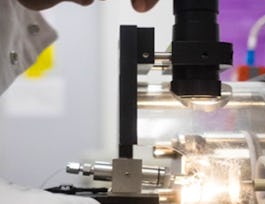This course gives an introduction to how to create genetic circuit models. These models leverage chemical reactions represented using the Systems Biology Markup Language (SBML). The second module introduces methods to simulate these models using ordinary differential equation (ODE) methods. The third module teach stochastic simulation methods. The fourth module introduces several variations of the stochastic simulation algorithm. Finally, the fifth module introduces genetic technology method that leverage computational analysis for selecting parts and verifying their performance.

Offrez à votre carrière le cadeau de Coursera Plus avec $160 de réduction, facturé annuellement. Économisez aujourd’hui.


Engineering Genetic Circuits: Modeling and Analysis
Ce cours fait partie de Spécialisation Engineering Genetic Circuits


Instructeurs : Chris Myers
Inclus avec 
Expérience recommandée
Ce que vous apprendrez
Design and analyze models of genetic circuits.
Simulate genetic circuit models using ODE simulation methods.
Simulate genetic circuit models using stochastic simulation methods.
Utilize genetic technology mappers to select parts for genetic designs.
Compétences que vous acquerrez
- Catégorie : Stochastic Simulation Analysis
- Catégorie : Genetic Technology Mapping
- Catégorie : Differential Equation Analysis
- Catégorie : Genetic Circuit Models
- Catégorie : SSA Variations
Détails à connaître

Ajouter à votre profil LinkedIn
16 devoirs
Découvrez comment les employés des entreprises prestigieuses maîtrisent des compétences recherchées

Élaborez votre expertise du sujet
- Apprenez de nouveaux concepts auprès d'experts du secteur
- Acquérez une compréhension de base d'un sujet ou d'un outil
- Développez des compétences professionnelles avec des projets pratiques
- Obtenez un certificat professionnel partageable


Obtenez un certificat professionnel
Ajoutez cette qualification à votre profil LinkedIn ou à votre CV
Partagez-le sur les réseaux sociaux et dans votre évaluation de performance

Il y a 5 modules dans ce cours
This week will describe the basics of modeling biological systems using chemical reactions, how these models can be represented using the Systems Biology Markup Language (SBML) standard, and how these models can be constructed using software tools such as iBioSim.
Inclus
23 vidéos6 lectures2 devoirs1 évaluation par les pairs
This module will introduce the theory and methods for the analysis of genetic circuit models using ordinary differential equations (ODEs). In particular, it will describe the classical chemical kinetic model, numerical methods for ODE simulation of these models, and techniques to analyze these ODE models qualitatively.
Inclus
13 vidéos3 lectures3 devoirs1 évaluation par les pairs
This module will introduce stochastic analysis methods for genetic circuits. In particular, it will introduce the stochastic chemical kinetics model, Gillespie's Stochastic Simulation Algorithm (SSA) to analyze these models, and various alternative stochastic analysis methods. Finally, the module will conclude with some additional topics: the Chemical Langevin Equation, stochastic Petri nets, the phage lambda model, and spatial Gillespie methods.
Inclus
20 vidéos4 lectures4 devoirs1 évaluation par les pairs
This module presents several variations on the SSA algorithm to solve particular analysis problems. In particular, the hierarchical SSA (hSSA) methods enable the analysis of large models, the weighted SSA (wSSA) methods allow for the analysis of rare events, and the incremental SSA (iSSA) methods enable the determination of typical behaviors.
Inclus
18 vidéos4 lectures3 devoirs
This module presents various ways that modeling can be utilized in genetic circuit design to select parts for optimal performance.
Inclus
21 vidéos4 lectures4 devoirs
Instructeurs


Offert par
Recommandé si vous êtes intéressé(e) par Electrical Engineering

Arizona State University

University of Manchester

L&T EduTech
Préparer un diplôme
Ce site cours fait partie du (des) programme(s) diplômant(s) suivant(s) proposé(s) par University of Colorado Boulder. Si vous êtes admis et que vous vous inscrivez, les cours que vous avez suivis peuvent compter pour l'apprentissage de votre diplôme et vos progrès peuvent être transférés avec vous.¹
Pour quelles raisons les étudiants sur Coursera nous choisissent-ils pour leur carrière ?





Ouvrez de nouvelles portes avec Coursera Plus
Accès illimité à plus de 7 000 cours de renommée internationale, à des projets pratiques et à des programmes de certificats reconnus sur le marché du travail, tous inclus dans votre abonnement
Faites progresser votre carrière avec un diplôme en ligne
Obtenez un diplôme auprès d’universités de renommée mondiale - 100 % en ligne
Rejoignez plus de 3 400 entreprises mondiales qui ont choisi Coursera pour les affaires
Améliorez les compétences de vos employés pour exceller dans l’économie numérique
Foire Aux Questions
Access to lectures and assignments depends on your type of enrollment. If you take a course in audit mode, you will be able to see most course materials for free. To access graded assignments and to earn a Certificate, you will need to purchase the Certificate experience, during or after your audit. If you don't see the audit option:
The course may not offer an audit option. You can try a Free Trial instead, or apply for Financial Aid.
The course may offer 'Full Course, No Certificate' instead. This option lets you see all course materials, submit required assessments, and get a final grade. This also means that you will not be able to purchase a Certificate experience.
When you enroll in the course, you get access to all of the courses in the Specialization, and you earn a certificate when you complete the work. Your electronic Certificate will be added to your Accomplishments page - from there, you can print your Certificate or add it to your LinkedIn profile. If you only want to read and view the course content, you can audit the course for free.
If you subscribed, you get a 7-day free trial during which you can cancel at no penalty. After that, we don’t give refunds, but you can cancel your subscription at any time. See our full refund policy.


